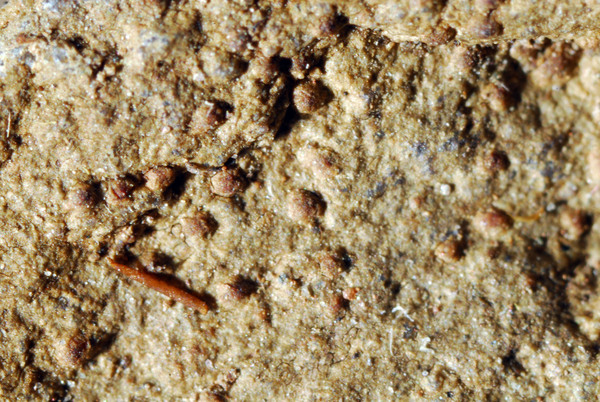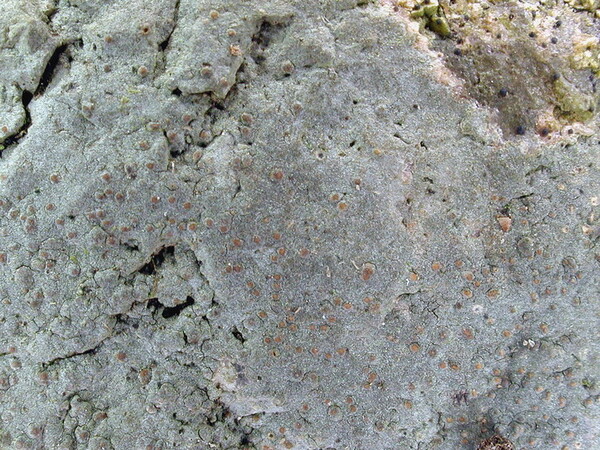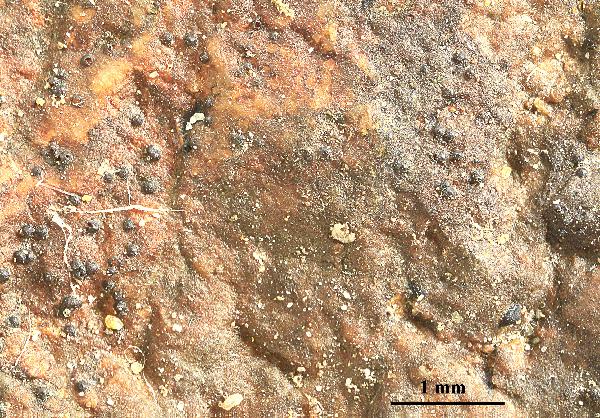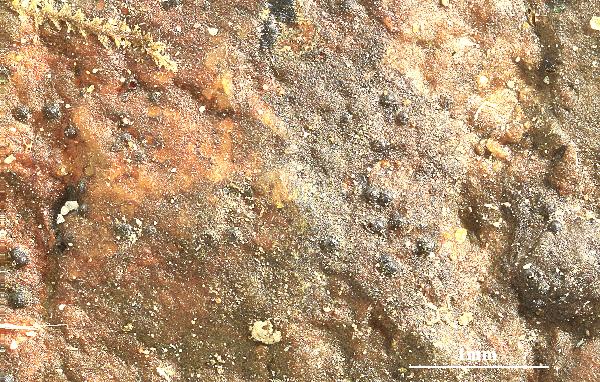Porina lectissima (Fr.) Zahlbr.
in Engler & Prantl, Natürl. Pflanzenfam., 1, 1: 66, 1903. Basionym: Segestria lectissima Fr. - Syst. Orb. Veg., 1: 287, 1825.
Synonyms: Sagedia umbonata (Schaer.) Jatta; Segestrella umbonata (Schaer.) Körb.; Verrucaria irrigua Taylor; Verrucaria rubiginosa Taylor; Verrucaria umbonata (Schaer.) Garov. nom. illegit.
Distribution: N - Frl (Tretiach 2004), TAA (Nascimbene & al. 2022), Lomb, Piem (Isocrono & al. 2004), Emil (Tretiach & al. 2008), Lig (Brunialti & al. 1999). C - Tosc (Tretiach & al. 2008), Sar (Nöske 2000, Nöske & al. 2000). S - Cal (Puntillo 1995, 1996), Si (CLU 11049).
Description: Thallus crustose, episubstratic, continuous or irregularly cracked, pale ochre to orange-brown or brownish green, turning brighter green when wet. Perithecia red-brown (brighter red when wet) to black (often only at apex) c. one third-immersed min the thallus, (0.2-)0.3-0.5 mm across. Involucrellum thick, of thick-walled, more or less elongated cells, containing photobiont cells, orange, K+ orange (Porina-yellow pigment), the upper part purple-violet and K+ dark blue-grey; paraphyses simple or rarely branched; hymenial gel I-, K/I-. Asci 8-spored, clavate-cylindrical, thin-walled throughout, functionally unitunicate, dehiscent by rupture of the apex, with no extruded inner layers and an apical ring structure, I-, K/I-. Ascospores 3(-6)-septate, hyaline, narrowly ellipsoid, 16-30(-45) x 4-8 μm. Pycnidia orange, more or less immersed. Conidia narrowly ellipsoid to cylindrical, 3-4.5 x 0.5-1 μm. Photobiont trentepohlioid. Spot tests: thallus K-, C-, KC-, P-, UV-. Chemistry: thallus without lichen substances. Note: a mild-temperate to Mediterranean-Atlantic species found on steeply inclined surfaces of siliceous rocks in shaded-moist situations, often in forests, or on periodically submerged rocks near creeks and lakes.
Growth form: Crustose
Substrata: rocks
Photobiont: Trentepohlia
Reproductive strategy: mainly sexual
Most common in areas with a humid-warm climate (e.g. most of Tyrrenian Italy)
Commonnes-rarity: (info)
Alpine belt: absent
Subalpine belt: absent
Oromediterranean belt: absent
Montane belt: rare
Submediterranean belt: extremely rare
Padanian area: absent
Humid submediterranean belt: very rare
Humid mediterranean belt: very rare
Dry mediterranean belt: absent
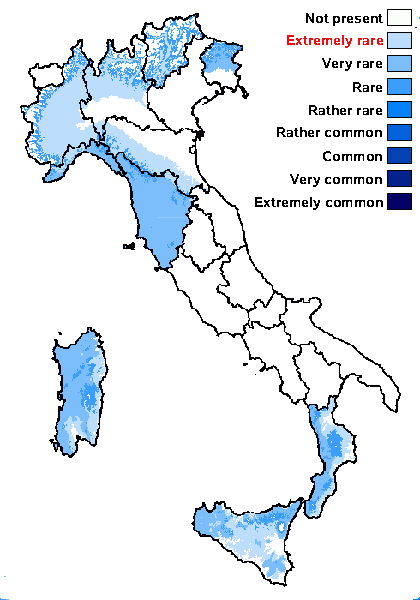
Predictive model
Herbarium samples
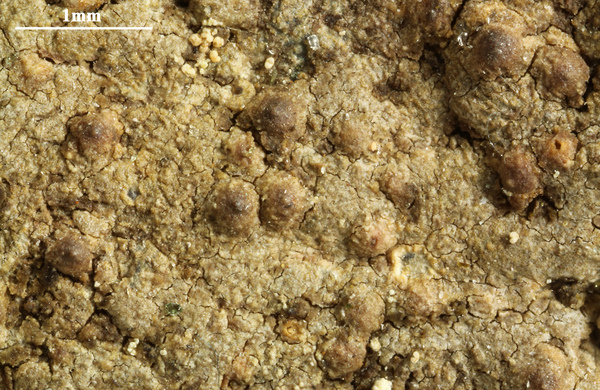

Felix Schumm - CC BY-SA4.0
[20958], Austria. Steiermark, Eastern Alps, Styrian Fringe Mountains, Koralpe, 8.9 km NW of Eibiswald, 1.6 km ENE of the church of St. Katharina in der Wiel, 46°43'50'' N, 15°08'50'' E, 760 m, big boulders of eclogite, on steep rock faces. Leg. J. Hafellner (no 74867), 28.11.2009, det J. Hafellner. DUPLA GRAECENSIA LICHENUM NR. 1168
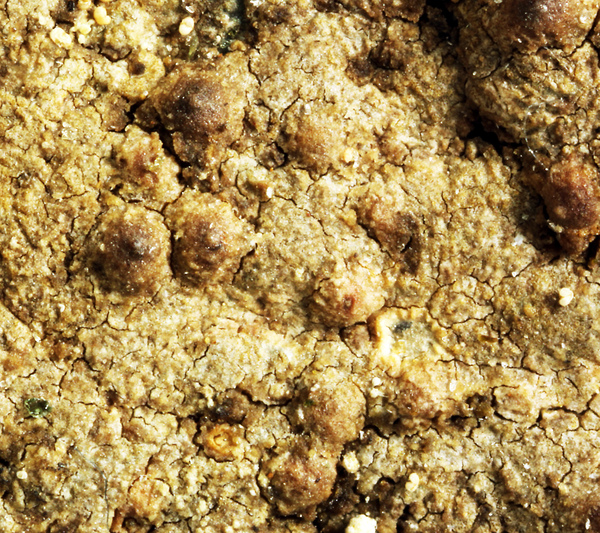

Felix Schumm CC BY-SA 4.0
[20958], Austria. Steiermark, Eastern Alps, Styrian Fringe Mountains, Koralpe, 8.9 km NW of Eibiswald, 1.6 km ENE of the church of St. Katharina in der Wiel, 46°43'50'' N, 15°08'50'' E, 760 m, big boulders of eclogite, on steep rock faces. Leg. J. Hafellner (no 74867), 28.11.2009, det J. Hafellner. DUPLA GRAECENSIA LICHENUM NR. 1168
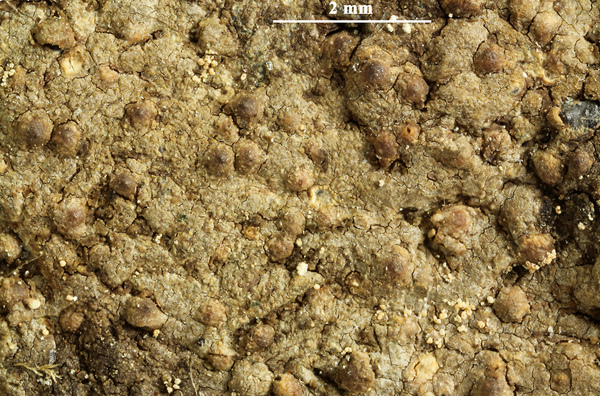

Felix Schumm - CC BY-SA4.0
[20958], Austria. Steiermark, Eastern Alps, Styrian Fringe Mountains, Koralpe, 8.9 km NW of Eibiswald, 1.6 km ENE of the church of St. Katharina in der Wiel, 46°43'50'' N, 15°08'50'' E, 760 m, big boulders of eclogite, on steep rock faces. Leg. J. Hafellner (no 74867), 28.11.2009, det J. Hafellner. DUPLA GRAECENSIA LICHENUM NR. 1168
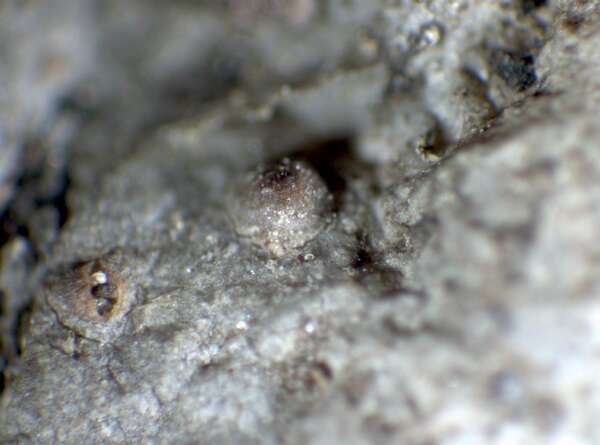

P.L. Nimis; Owner: Department of Life Sciences, University of Trieste
Herbarium: TSB (10728)
2001/11/29
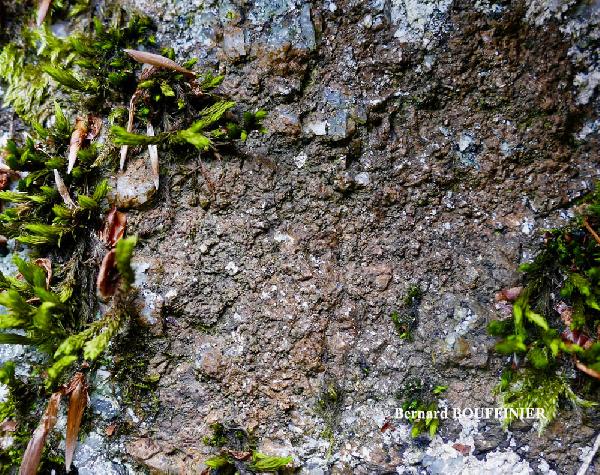
Bernard Bouffinier - Source: http://www.lichensmaritimes.org/index.php?task=fiche&lichen=609&lang=en
France, Huelgoat
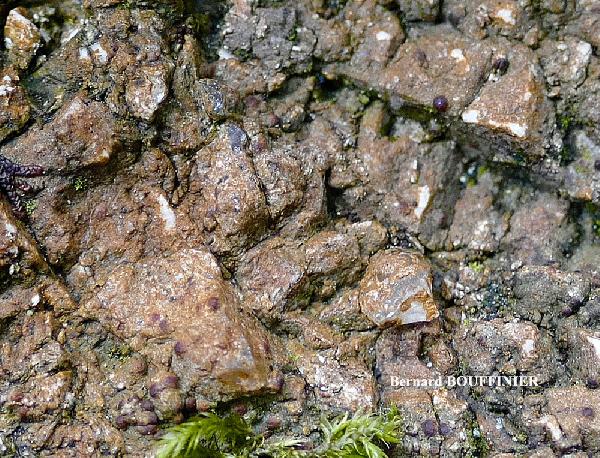
Bernard Bouffinier - Source: http://www.lichensmaritimes.org/index.php?task=fiche&lichen=609&lang=en
France, Huelgoat
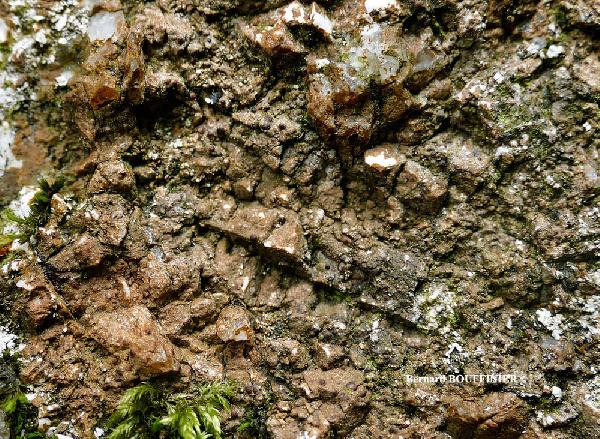
Bernard Bouffinier - Source: http://www.lichensmaritimes.org/index.php?task=fiche&lichen=609&lang=en
France, Huelgoat
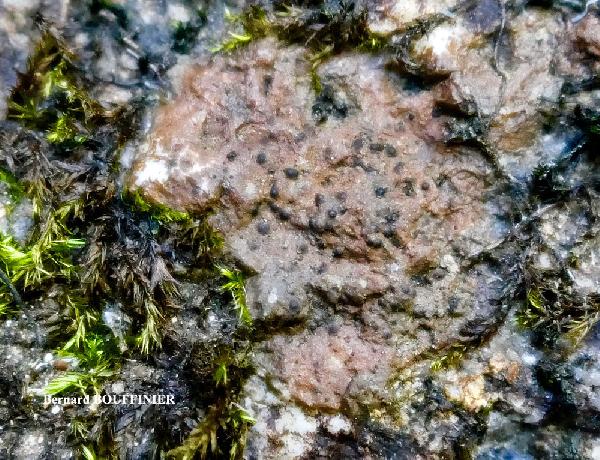
Bernard Bouffinier - Source: http://www.lichensmaritimes.org/index.php?task=fiche&lichen=609&lang=en
France, St. Herbot
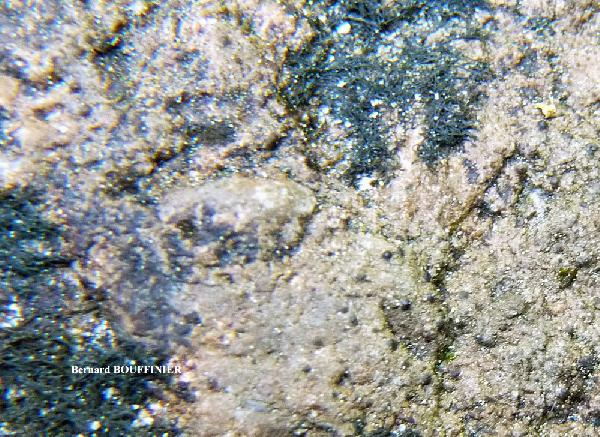
Bernard Bouffinier - Source: http://www.lichensmaritimes.org/index.php?task=fiche&lichen=609&lang=en
France, St. Herbot
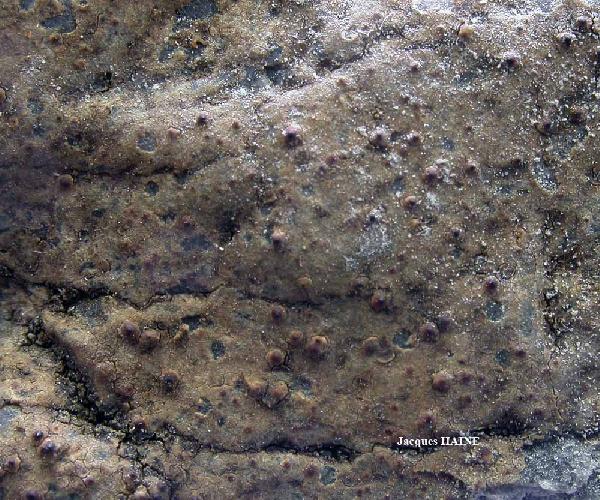
Jacques Haine - Source: http://www.lichensmaritimes.org/index.php?task=fiche&lichen=609&lang=en
France, Ardennes
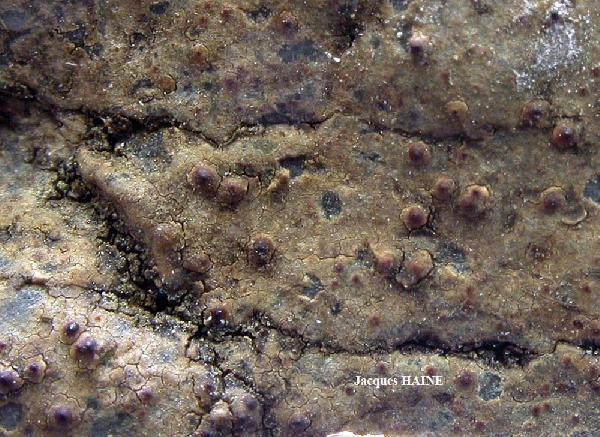
Jacques Haine - Source: http://www.lichensmaritimes.org/index.php?task=fiche&lichen=609&lang=en
France, Ardennes
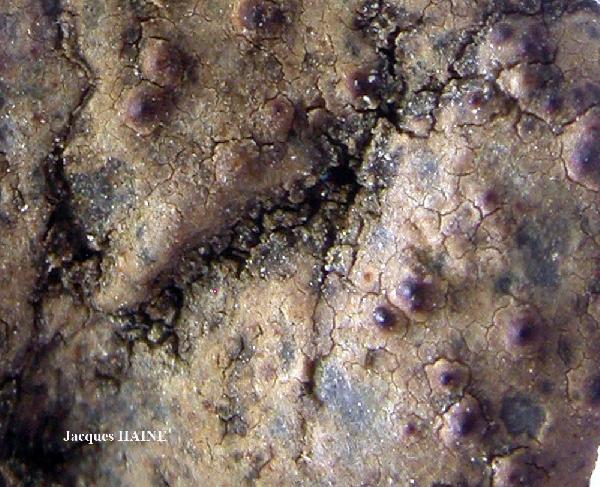
Jacques Haine - Source: http://www.lichensmaritimes.org/index.php?task=fiche&lichen=609&lang=en
France, Ardennes
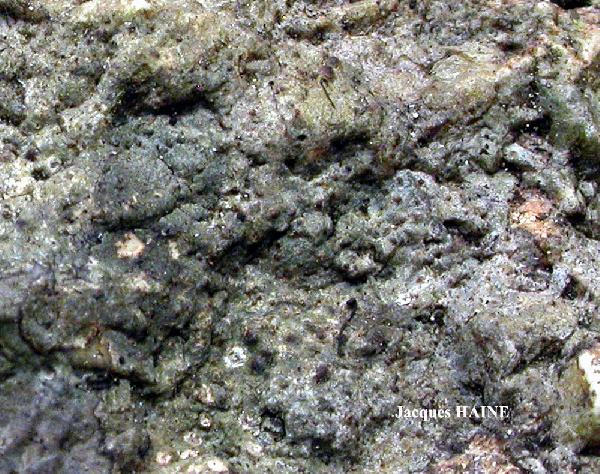
Jacques Haine - Source: http://www.lichensmaritimes.org/index.php?task=fiche&lichen=609&lang=en
France, St. Herbot
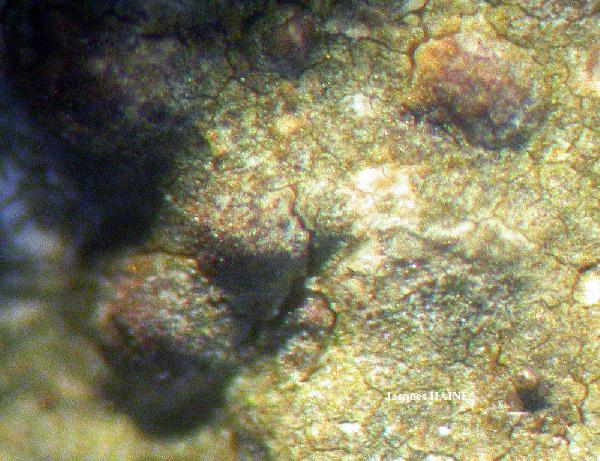
Jacques Haine - Source: http://www.lichensmaritimes.org/index.php?task=fiche&lichen=609&lang=en
France, St. Herbot
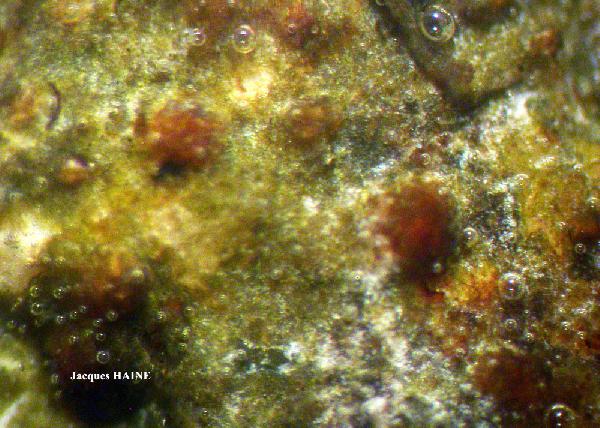
Jacques Haine - Source: http://www.lichensmaritimes.org/index.php?task=fiche&lichen=609&lang=en
France, St. Herbot
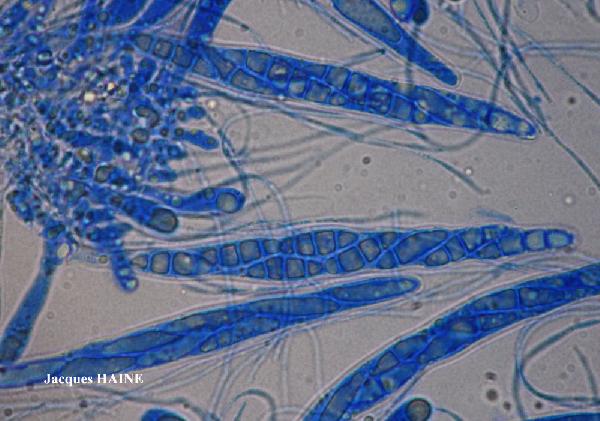
Jacques Haine - Source: http://www.lichensmaritimes.org/index.php?task=fiche&lichen=609&lang=en
France, St. Herbot
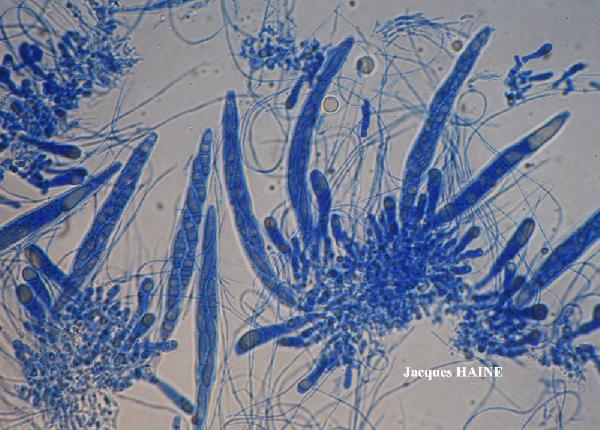
Jacques Haine - Source: http://www.lichensmaritimes.org/index.php?task=fiche&lichen=609&lang=en
France, St. Herbot
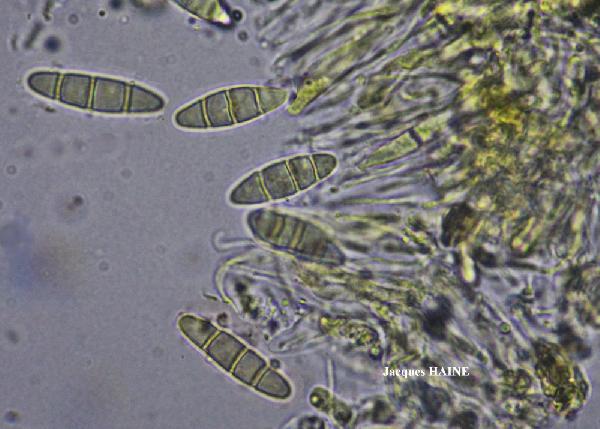
Jacques Haine - Source: http://www.lichensmaritimes.org/index.php?task=fiche&lichen=609&lang=en
France, St. Herbot
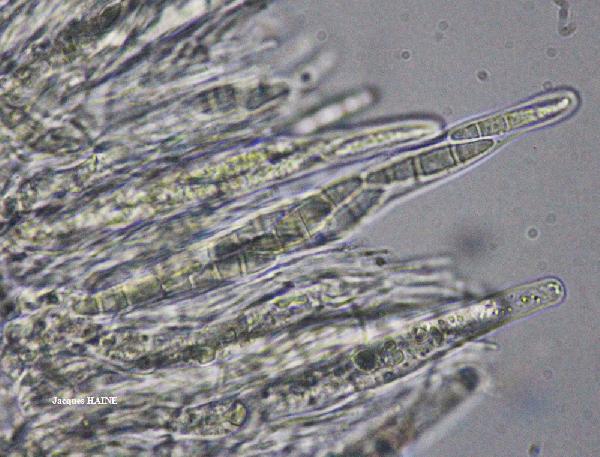
Jacques Haine - Source: http://www.lichensmaritimes.org/index.php?task=fiche&lichen=609&lang=en
France, Ardennes
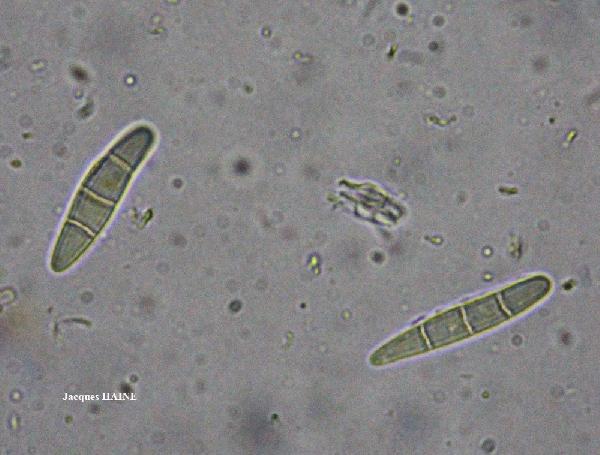
Jacques Haine - Source: http://www.lichensmaritimes.org/index.php?task=fiche&lichen=609&lang=en
France, Ardennes
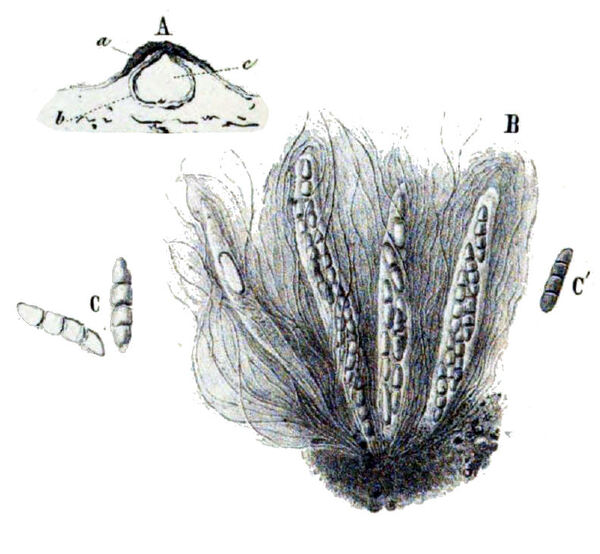
G. Gibelli, in S. Garovaglio, 1865 Tentamen Dispositionis Methodicae Lichenum In Longobardia Nascentium. Mediolanum
as Verrucaria umbonata (Schaer.) Garov.
Growth form: Crustose
Substrata: rocks
Photobiont: Trentepohlia
Reproductive strategy: mainly sexual
Most common in areas with a humid-warm climate (e.g. most of Tyrrenian Italy)
Commonnes-rarity: (info)
Alpine belt: absent
Subalpine belt: absent
Oromediterranean belt: absent
Montane belt: rare
Submediterranean belt: extremely rare
Padanian area: absent
Humid submediterranean belt: very rare
Humid mediterranean belt: very rare
Dry mediterranean belt: absent

Predictive model
| Herbarium samples |


Felix Schumm - CC BY-SA4.0
[20958], Austria. Steiermark, Eastern Alps, Styrian Fringe Mountains, Koralpe, 8.9 km NW of Eibiswald, 1.6 km ENE of the church of St. Katharina in der Wiel, 46°43'50'' N, 15°08'50'' E, 760 m, big boulders of eclogite, on steep rock faces. Leg. J. Hafellner (no 74867), 28.11.2009, det J. Hafellner. DUPLA GRAECENSIA LICHENUM NR. 1168


Felix Schumm CC BY-SA 4.0
[20958], Austria. Steiermark, Eastern Alps, Styrian Fringe Mountains, Koralpe, 8.9 km NW of Eibiswald, 1.6 km ENE of the church of St. Katharina in der Wiel, 46°43'50'' N, 15°08'50'' E, 760 m, big boulders of eclogite, on steep rock faces. Leg. J. Hafellner (no 74867), 28.11.2009, det J. Hafellner. DUPLA GRAECENSIA LICHENUM NR. 1168


Felix Schumm - CC BY-SA4.0
[20958], Austria. Steiermark, Eastern Alps, Styrian Fringe Mountains, Koralpe, 8.9 km NW of Eibiswald, 1.6 km ENE of the church of St. Katharina in der Wiel, 46°43'50'' N, 15°08'50'' E, 760 m, big boulders of eclogite, on steep rock faces. Leg. J. Hafellner (no 74867), 28.11.2009, det J. Hafellner. DUPLA GRAECENSIA LICHENUM NR. 1168


P.L. Nimis; Owner: Department of Life Sciences, University of Trieste
Herbarium: TSB (10728)
2001/11/29

Bernard Bouffinier - Source: http://www.lichensmaritimes.org/index.php?task=fiche&lichen=609&lang=en
France, Huelgoat

Bernard Bouffinier - Source: http://www.lichensmaritimes.org/index.php?task=fiche&lichen=609&lang=en
France, Huelgoat

Bernard Bouffinier - Source: http://www.lichensmaritimes.org/index.php?task=fiche&lichen=609&lang=en
France, Huelgoat

Bernard Bouffinier - Source: http://www.lichensmaritimes.org/index.php?task=fiche&lichen=609&lang=en
France, St. Herbot

Bernard Bouffinier - Source: http://www.lichensmaritimes.org/index.php?task=fiche&lichen=609&lang=en
France, St. Herbot

Jacques Haine - Source: http://www.lichensmaritimes.org/index.php?task=fiche&lichen=609&lang=en
France, Ardennes

Jacques Haine - Source: http://www.lichensmaritimes.org/index.php?task=fiche&lichen=609&lang=en
France, Ardennes

Jacques Haine - Source: http://www.lichensmaritimes.org/index.php?task=fiche&lichen=609&lang=en
France, Ardennes

Jacques Haine - Source: http://www.lichensmaritimes.org/index.php?task=fiche&lichen=609&lang=en
France, St. Herbot

Jacques Haine - Source: http://www.lichensmaritimes.org/index.php?task=fiche&lichen=609&lang=en
France, St. Herbot

Jacques Haine - Source: http://www.lichensmaritimes.org/index.php?task=fiche&lichen=609&lang=en
France, St. Herbot

Jacques Haine - Source: http://www.lichensmaritimes.org/index.php?task=fiche&lichen=609&lang=en
France, St. Herbot

Jacques Haine - Source: http://www.lichensmaritimes.org/index.php?task=fiche&lichen=609&lang=en
France, St. Herbot

Jacques Haine - Source: http://www.lichensmaritimes.org/index.php?task=fiche&lichen=609&lang=en
France, St. Herbot

Jacques Haine - Source: http://www.lichensmaritimes.org/index.php?task=fiche&lichen=609&lang=en
France, Ardennes

Jacques Haine - Source: http://www.lichensmaritimes.org/index.php?task=fiche&lichen=609&lang=en
France, Ardennes

 INDEX FUNGORUM
INDEX FUNGORUM
 GBIF
GBIF
 DOLICHENS
DOLICHENS
